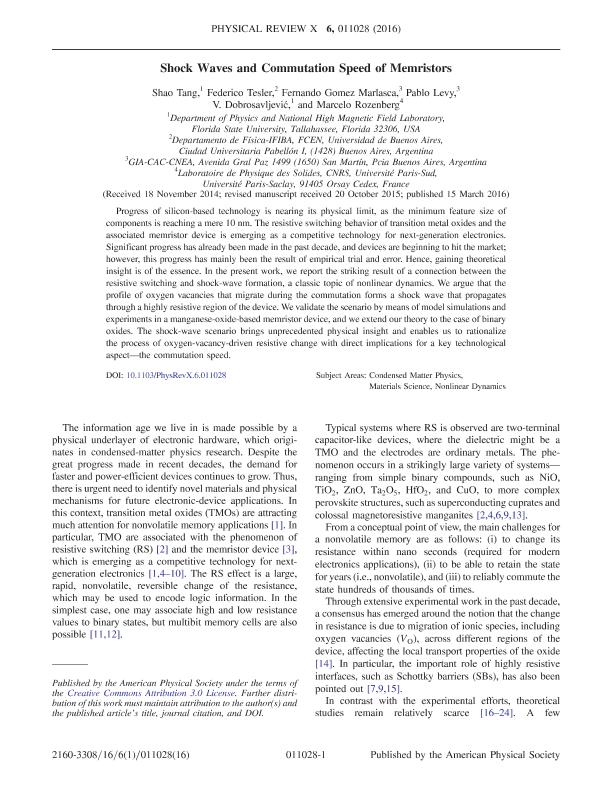Artículo
Shock waves and commutation speed of memristors
Tang, Shao; Tesler, Federico Ariel ; Gomez Marlasca, Fernando; Levy, Pablo Eduardo
; Gomez Marlasca, Fernando; Levy, Pablo Eduardo ; Dobrosavljevic, V.; Rozenberg, Marcelo Javier
; Dobrosavljevic, V.; Rozenberg, Marcelo Javier
 ; Gomez Marlasca, Fernando; Levy, Pablo Eduardo
; Gomez Marlasca, Fernando; Levy, Pablo Eduardo ; Dobrosavljevic, V.; Rozenberg, Marcelo Javier
; Dobrosavljevic, V.; Rozenberg, Marcelo Javier
Fecha de publicación:
03/2016
Editorial:
American Physical Society
Revista:
Physical Review X
ISSN:
2160-3308
Idioma:
Inglés
Tipo de recurso:
Artículo publicado
Clasificación temática:
Resumen
Progress of silicon-based technology is nearing its physical limit, as the minimum feature size of components is reaching a mere 10 nm. The resistive switching behavior of transition metal oxides and the associated memristor device is emerging as a competitive technology for next-generation electronics. Significant progress has already been made in the past decade, and devices are beginning to hit the market; however, this progress has mainly been the result of empirical trial and error. Hence, gaining theoretical insight is of the essence. In the present work, we report the striking result of a connection between the resistive switching and shock-wave formation, a classic topic of nonlinear dynamics. We argue that the profile of oxygen vacancies that migrate during the commutation forms a shock wave that propagates through a highly resistive region of the device. We validate the scenario by means of model simulations and experiments in a manganese-oxide-based memristor device, and we extend our theory to the case of binary oxides. The shock-wave scenario brings unprecedented physical insight and enables us to rationalize the process of oxygen-vacancy-driven resistive change with direct implications for a key technological aspect-the commutation speed.
Palabras clave:
Shockwaves
,
memristors
Archivos asociados
Licencia
Identificadores
Colecciones
Articulos(OCA CIUDAD UNIVERSITARIA)
Articulos de OFICINA DE COORDINACION ADMINISTRATIVA CIUDAD UNIVERSITARIA
Articulos de OFICINA DE COORDINACION ADMINISTRATIVA CIUDAD UNIVERSITARIA
Articulos(SEDE CENTRAL)
Articulos de SEDE CENTRAL
Articulos de SEDE CENTRAL
Citación
Tang, Shao; Tesler, Federico Ariel; Gomez Marlasca, Fernando; Levy, Pablo Eduardo; Dobrosavljevic, V.; et al.; Shock waves and commutation speed of memristors; American Physical Society; Physical Review X; 6; 1; 3-2016; 11028-11028
Compartir
Altmétricas



